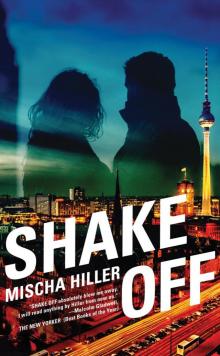- Home
- Mischa Hiller
Disengaged
Disengaged Read online
Table of Contents
Cover
Recent Titles by Mischa Hiller
Title Page
Copyright
Dedication
Acknowledgements
Chapter One
Chapter Two
Chapter Three
Chapter Four
Chapter Five
Chapter Six
Chapter Seven
Chapter Eight
Chapter Nine
Chapter Ten
Chapter Eleven
Chapter Twelve
Chapter Thirteen
Chapter Fourteen
Chapter Fifteen
Chapter Sixteen
Chapter Seventeen
Chapter Eighteen
Chapter Nineteen
Chapter Twenty
Chapter Twenty-One
Chapter Twenty-Two
Chapter Twenty-Three
Chapter Twenty-Four
Chapter Twenty-Five
Chapter Twenty-Six
Chapter Twenty-Seven
Chapter Twenty-Eight
Chapter Twenty-Nine
Chapter Thirty
Chapter Thirty-One
Chapter Thirty-Two
Chapter Thirty-Three
Chapter Thirty-Four
Chapter Thirty-Five
Chapter Thirty-Six
Chapter Thirty-Seven
Chapter Thirty-Eight
Chapter Thirty-Nine
Chapter Forty
Chapter Forty-One
Chapter Forty-Two
Chapter Forty-Three
Chapter Forty-Four
Chapter Forty-Five
Chapter Forty-Six
Chapter Forty-Seven
Chapter Forty-Eight
Chapter Forty-Nine
Chapter Fifty
Chapter Fifty-One
Chapter Fifty-Two
Chapter Fifty-Three
Chapter Fifty-Four
Chapter Fifty-Five
Chapter Fifty-Six
Chapter Fifty-Seven
Recent Titles by Mischa Hiller
SABRA ZOO
SHAKE OFF
DISENGAGED *
* available from Severn House
DISENGAGED
Mischa Hiller
This ebook is copyright material and must not be copied, reproduced, transferred, distributed, leased, licensed or publicly performed or used in any way except as specifically permitted in writing by the publishers, as allowed under the terms and conditions under which it was purchased or as strictly permitted by applicable copyright law. Any unauthorised distribution or use of this text may be a direct infringement of the author’s and publisher’s rights and those responsible may be liable in law accordingly.
This first world edition published 2015
in Great Britain and the USA by
SEVERN HOUSE PUBLISHERS LTD of
19 Cedar Road, Sutton, Surrey, England, SM2 5DA.
Trade paperback edition first published 2015 in Great
Britain and the USA by SEVERN HOUSE PUBLISHERS LTD.
eBook edition first published in 2015 by Severn House Digital
an imprint of Severn House Publishers Limited
Copyright © 2015 by Mischa Hiller
The right of Mischa Hiller to be identified as the author of this work has been asserted in accordance with the Copyright, Designs & Patents Act 1988.
British Library Cataloguing in Publication Data
Hiller, Mischa author.
Disengaged.
1. Computer software industry–Fiction. 2. Suspense
fiction.
I. Title
823.9’2-dc23
ISBN-13: 978-0-7278-8473-2 (cased)
ISBN-13: 978-1-84751-557-5 (trade paper)
ISBN-13: 978-1-78010-604-5 (e-book)
Except where actual historical events and characters are being described for the storyline of this novel, all situations in this publication are fictitious and any resemblance to living persons is purely coincidental.
This ebook produced by
Palimpsest Book Production Limited, Falkirk,
Stirlingshire, Scotland.
This book is dedicated to the memory of Paul Westlake, a trusted reader and all-round good egg.
ACKNOWLEDGEMENTS
Thanks to Professor Andrew Dempster, Sarah Dobbs, Will Frazer and Azadeh Moaveni for helping me with research for the book.
ONE
Europeans could no more tell a Turk from an Iranian, Mojgan thought, than she could distinguish an English person from an American, just by looking at them. That’s why she’d had no problem at the airport, travelling on a German passport with a Turkish name.
She was sitting in a fast-food restaurant in St Pancras railway station, London, watching the rapid flow of people outside on the concourse. The chicken she’d ordered sat untouched in front of her, the nausea caused by the greasy smell quelled only slightly by the weak coffee they were fond of serving in Europe. They compensated for taste with volume, and served it in ever larger cups. Only in Turkey had she been served decent coffee, but that didn’t really count; that was still within the realms of civilisation. It was late afternoon and just twenty minutes since she’d arrived on a train from Luton airport. She was tired after her four-hour flight from Bodrum in Turkey, which had been preceded by a forty-hour overland trip from Tehran which had taken nearly three days with stops.
On her smart phone – containing a new SIM card she’d activated on the train – she started an app that allowed you to play a version of online Scrabble. With practised thumbs she logged in as ‘Mawlana’ and keyed the username ‘Shamsuddin’ into the ‘Invite to Play’ box. As she waited for a response she looked out at the busy station concourse. Her first visit to England had so far been limited to the transport system. Soon she would have to venture into the city of London, and a period of decompression seemed like a good idea. A soft tone meant that her invitation to a new game had been accepted by Shamsuddin. A set of random letters appeared at the bottom of the screen. She placed three of them on the board to create a basic word. Only five points scored. She waited. A new notification appeared telling her that her opponent had sent her a private message. She smiled and touched it with her finger.
Are you ready for a new game? it read.
Only if you are you ready to lose, she typed.
Shall we agree no dictionary? came the reply.
Agreed. No dictionary. With the prearranged authentication over with, she waited. At another table an overweight man in a suit, Asian by the look of him, was staring at her as he pushed fries into his mouth. She wasn’t wearing her headscarf, although her hair, as always when she was in public without it, was tied back, and she was dressed in a grey trouser suit, just another woman travelling on business. Mojgan had learnt through experience that, on the whole, wearing the scarf in Europe attracted more attention than not wearing it. She wasn’t sure which was worse: the openly appraising stare she was now ignoring, which every male thought was his right to indulge in, or the curious and sometimes hostile ones she attracted when she had it on. Since, in her current setting, she felt more invisible without it, and her job was, after all, to remain invisible, she kept it in her bag. It came in useful when needing to gain the trust of Muslim contacts in Europe, some of whom, especially the men, confused a love of the Almighty with piety and fervour. In some ways they could be worse than the people back home, so when their initial surprise at having to deal with a woman was replaced with a realization of whom she represented, they became obsequious. It was a moment she had come to relish, that switch from derision to deference.
She looked down at her phone. Her opponent, his beautiful face still fresh in her mind, had laid a six-letter wo
rd across hers and scored twenty-seven points. She smiled and typed, Are you cheating?
A delay, during which she worried that she’d strayed from the script, but then her remark was quite innocent to any possible eavesdropper. Then the message came back: No! My english is improving ;-)
She played another word, this time scoring nine points. Soon the expected SMS text appeared: just a message that said supper is ready. She went back to the word game and typed, I am going shopping now; I will continue this game tomorrow.
OK, came the reply, I hope you find what you need. Again she smiled. She could picture Farsheed’s face, four hours ahead, somewhere in Azerbaijan. He’d told her it had become the new front line against the Zionists.
She logged out of the app and checked her make-up in a small mirror taken from her voluminous handbag. When putting it back she made sure, for the millionth time, that she still had the cash she’d recovered from the suitcase lining after passing through customs. She then took a piece of paper from a pad and wrote down a memorized address. She had associated the number and street name with various physical objects to make it easier. She left her meal uneaten and wheeled her small case out on to the concourse, then outside into what passed in England for heat, judging by the bare legs and arms of the women, to whom nobody seemed to pay much heed. After a short wait at the taxi rank she got into the back of one of those black London cabs she’d seen in films and held the piece of paper against the glass screen so the driver could read the address. She wasn’t confident that she would pronounce it properly.
‘First time in London, love?’
‘Yes.’ Had he just called her ‘love’?
‘Business or pleasure?’
‘Business,’ she said.
She sat back where the driver couldn’t see her in his rearview mirror and ripped up the address, after which she gradually let the pieces out of the window in dribs and drabs. She tried to relax. She would feel much happier when the job was done and she was on her way back home, where Farsheed would have returned from his own mission and could comb his fingers through her unbound hair.
TWO
The doctor, a male somewhere in his fifties, looked suitably attired for someone charging Julian hundreds of pounds per consultation, not including all the tests he’d had. Julian reckoned the doctor’s suit had cost him two sessions, the shoes another. The doctor looked at Julian over frameless reading glasses, a piece of paper held in both hands, his elbows on the heavyweight wooden desk. There was even a blotter on the table, for Christ’s sake, and an ultra-sleek laptop to one side which was presumably designed to convey to patients that their doctor was up to date with technology but wouldn’t let it come between him and his patients.
‘There’s nothing in the results to indicate any anomalies,’ he said. He glanced down at the sheet before him and shook his head. ‘No, everything looks fine.’ It seemed to Julian that he’d wanted to add ‘as usual’, but £300 of professionalism had curbed his tongue.
‘So where next?’ asked Julian, shifting in the leather armchair. Maybe Dr Banerjee was too old fashioned. Maybe Julian needed a younger doctor aware of new scientific approaches that had bypassed Banerjee. The doctor put the results down on an open file and took off his glasses, folding them a little too affectedly for Julian’s liking before placing them above the file on the pristine blotter.
‘Well, where would you like to go next?’ he asked.
Julian deliberately frowned, asking, ‘Isn’t that your job, Dr Banerjee?’, keeping the stress on ‘your’ just the right side of sarcasm. Dr Banerjee sighed and his shoulders slumped as he did so. He wiped a hand down his face and revealed a different man.
‘You’ve been coming here for’ – he consulted the file in front of him – ‘for nearly six months now and I’ve found nothing wrong with you. We’ve run various heart tests, you’ve had an endoscopy, a colonoscopy, X-rays, numerous blood tests and, if memory serves, a liver biopsy. The most I can find wrong is irritable bowel syndrome and slightly elevated liver enzymes; in line with most of the population, in fact. The truth is, much as I’d like to keep taking your money, I don’t think there’s much point to more tests. I’d be lying to you if I thought them necessary.’ Julian sat through this without reacting. He looked at the fat fountain pen that Dr Banerjee was caressing with his chubby fingers.
‘So there’s nothing you can do for me?’
The doctor stopped caressing the pen and put his fingers together. ‘Well, there is one approach left to explore,’ he said. ‘But it depends how open you are to it.’
‘I don’t know until I hear what it is, but I’m not into any New Age mumbo-jumbo,’ Julian said. Dr Banerjee put his glasses back on, took the cap off his fountain pen and scratched something on a pad. He typed briefly into his laptop, peered at the screen, then scratched some more. He ripped the sheet from his pad and passed it to Julian.
‘She’s the best in her field. My recommendation is that you go and see her.’
Julian took the sheet and looked at the name and a London telephone number.
‘She sees her private patients in Bloomsbury,’ the doctor said, as if to reassure Julian that she was too classy to have a surgery in Harley Street, where hundreds of doctors rented rooms so they could use the prestigious address for their private practice.
‘What’s her specialty then?’ Julian asked, studying the name as if it would tell him. Dr Banerjee put his elbows on the table, and his hands together as if in prayer. He hadn’t removed his glasses, so he lowered his chin to look at Julian over the top of the frames.
‘Have you considered the possibility, Mr Fisher, that your problems could be psychosomatic in nature?’
THREE
An hour after leaving Harley Street Julian was sitting in his business partner’s office in north London. Rami, who was dressed in a more stylishly modern suit than Dr Banerjee but without a tie, sat knee-to-knee opposite. They had adjacent offices overlooking the open-plan area where the software development team worked. Glass-fronted, so that, according to Rami, less of a perceived barrier existed between management and workers at Hadfish Systems (an amalgamation of their surnames, Haddad and Fisher, had seemed like a good idea all those years ago). As it was, Julian spent a lot of his time sitting next to one of the software developers in the open-plan area, as he liked to keep his hand in, although Rami told him he was micromanaging. But then Rami didn’t really understand project management, or coding for that matter.
‘Everything all right at the doctor’s?’ he asked, swivelling from the waist down in his hi-tech chair. Rami had his desk against the wall because he said he wanted nothing between him and anyone popping in to see him. Julian had his facing the door, and, unlike Rami’s glass slab, had something he could sit behind. A bit like Dr Banerjee, now that he thought about it.
‘Fine. Everything’s fine. Just a checkup.’
‘Good. Good.’ He got up and closed his door. The last time he’d done that was the day after Julian had taken ill in the office, believing he was having a heart attack. Paramedics had been called but they’d left, claiming it was a panic attack. Luckily everyone apart from Rami had already gone home. The next morning he’d ushered Julian into this office, closed the door, and insisted he go and see someone privately as the NHS were not to be trusted; all they cared about was keeping him from occupying a precious bed. So it was on Rami’s recommendation that he’d first gone to see Dr Banerjee in Harley Street, a man who now believed Julian’s symptoms were all in his mind.
‘Listen, Jules, I think I’m on to something that might, just might, take us to a different level.’
‘Oh, yes?’ Julian was used to Rami’s hyperbole, although he seemed more excited than usual. He was the sales side of the company, relentlessly chasing clients, doing presentations, pitching for jobs, submitting tenders. Julian did help with some of these things, especially on the technical side, but he was primarily responsible for developing the software they sold. Over the last ten
years they had carved themselves a comfortable niche with their compression software which was embedded in high-end graphics cards used by gamers, scientists, engineers and designers around the world. But the market had stagnated, and new areas of work were proving hard to find. Whenever he tried to explain to Sheila what it was he did, she’d play dead, literally going limp and pretending she was unconscious.
Rami, long inured to Julian’s cynical tone, was carrying on enthusiastically. ‘You know how we’ve talked about expanding into other areas but not known how? Well, I think I may have found a path to the big money.’
‘Really? You mean the three-hundred-and-sixty-degree gaming prototype using GPS?’
Rami shook his head and Julian shrugged off his disappointment. He’d spent two years developing the software that at one stage he had hoped would revolutionize online interactive gaming, but it was a dead dream. And as dreams went, Julian had come to the conclusion that it was rather pathetic.
‘No, but it uses GPS technology, so you should be in your element. Tell me, what’s the biggest and most recession-proof market that you can think of?’
‘Drugs,’ Julian said without hesitation. ‘Although I can’t see how drug-dealers would benefit from our expertise.’ Rami stopped swivelling and leaned forward.

 Shake Off
Shake Off Sabra Zoo
Sabra Zoo Disengaged
Disengaged